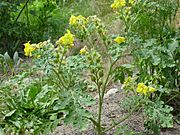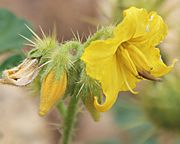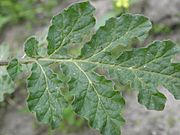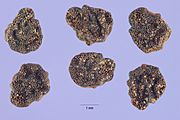Buffalobur nightshade facts for kids
Quick facts for kids Buffalobur nightshade |
|
|---|---|
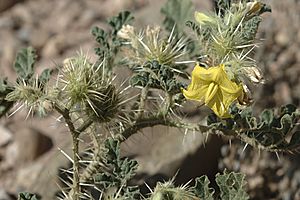 |
|
| Scientific classification | |
| Kingdom: | |
| (unranked): | |
| (unranked): | |
| (unranked): | |
| Order: | |
| Family: | |
| Genus: |
Solanum
|
| Subgenus: |
Leptostemonum
|
| Section: |
Crinitum
|
| Species: |
S. rostratum
|
| Binomial name | |
| Solanum rostratum Dunal
|
|
| Synonyms | |
|
Solanum cornutum auct. |
|
Solanum rostratum is a wild plant from the nightshade family. It is also known by many common names like buffalo-bur or spiny nightshade. This plant grows naturally in the United States and Mexico.
Contents
Discover the Buffalo-Bur Plant
What Does the Buffalo-Bur Look Like?
The buffalo-bur is an annual plant, meaning it lives for only one growing season. It is a herb that can grow into a tumbleweed. Individual plants can reach about 1 to 1.5 meters (3 to 5 feet) tall.
Its stems and leaves have many sharp spines. The leaves are deeply cut, almost like feathers. The plant produces bright yellow flowers. These flowers are about 2 to 3.5 centimeters (0.8 to 1.4 inches) wide. They have five petals that form a star shape.
How Buffalo-Bur Flowers Work
Buffalo-bur flowers have a special feature called heteranthery. This means they have two different kinds of anthers. Anthers are the parts of a flower that produce pollen. One set of anthers is for feeding bees, while the other set helps with pollination.
Medium to large-sized bees, like bumblebees, help pollinate the buffalo-bur. They carry pollen from one flower to another.
How Buffalo-Bur Spreads Seeds
After the flowers, the plant produces a berry fruit. This fruit is covered by a prickly outer layer called a calyx. When the berries dry out, they split open while still on the plant. This process is called dehiscence. It releases the tiny seeds inside.
Interesting Facts About Buffalo-Bur
Charles Darwin's Interest
The famous biologist Charles Darwin was very interested in Solanum rostratum. Just over a week before he passed away, he ordered seeds of this plant. He wanted to study its unique anthers (heteranthery).
Home of the Colorado Potato Beetle
The buffalo-bur plant is the original home of the Colorado potato beetle. This insect, Leptinotarsa decemlineata, used to live on buffalo-bur plants. However, in 1859, people noticed that the beetles started eating potato plants instead. Potato plants are a tastier food source for them. The beetles then quickly spread across potato farms in the eastern United States.
 | Leon Lynch |
 | Milton P. Webster |
 | Ferdinand Smith |


